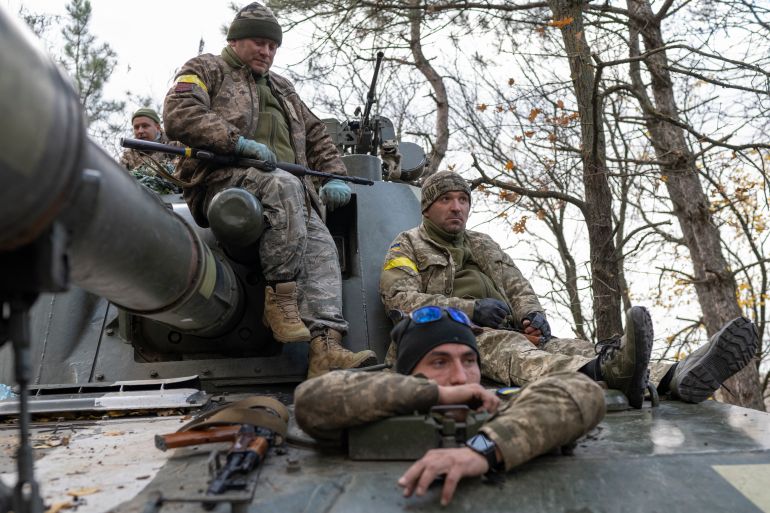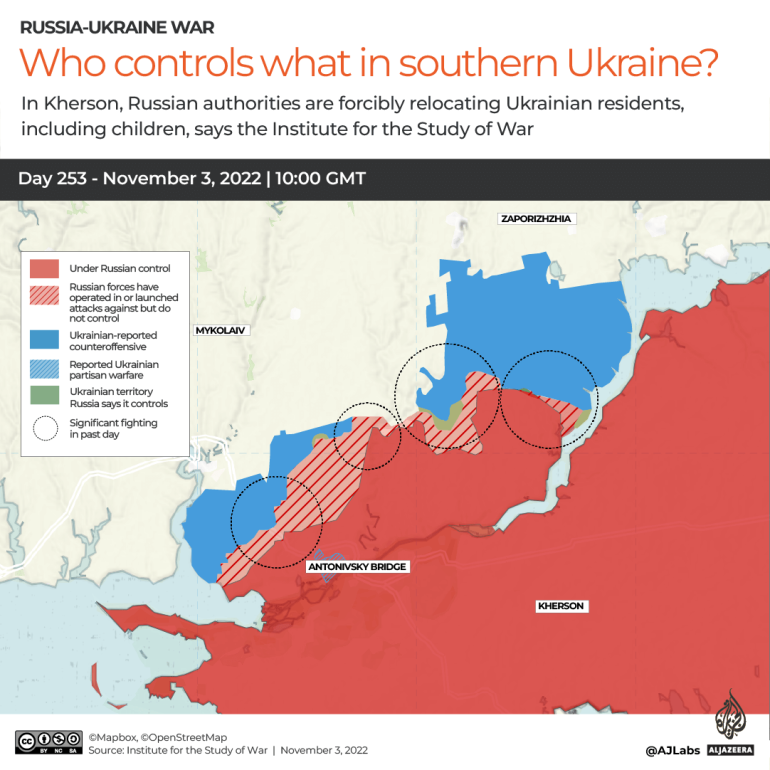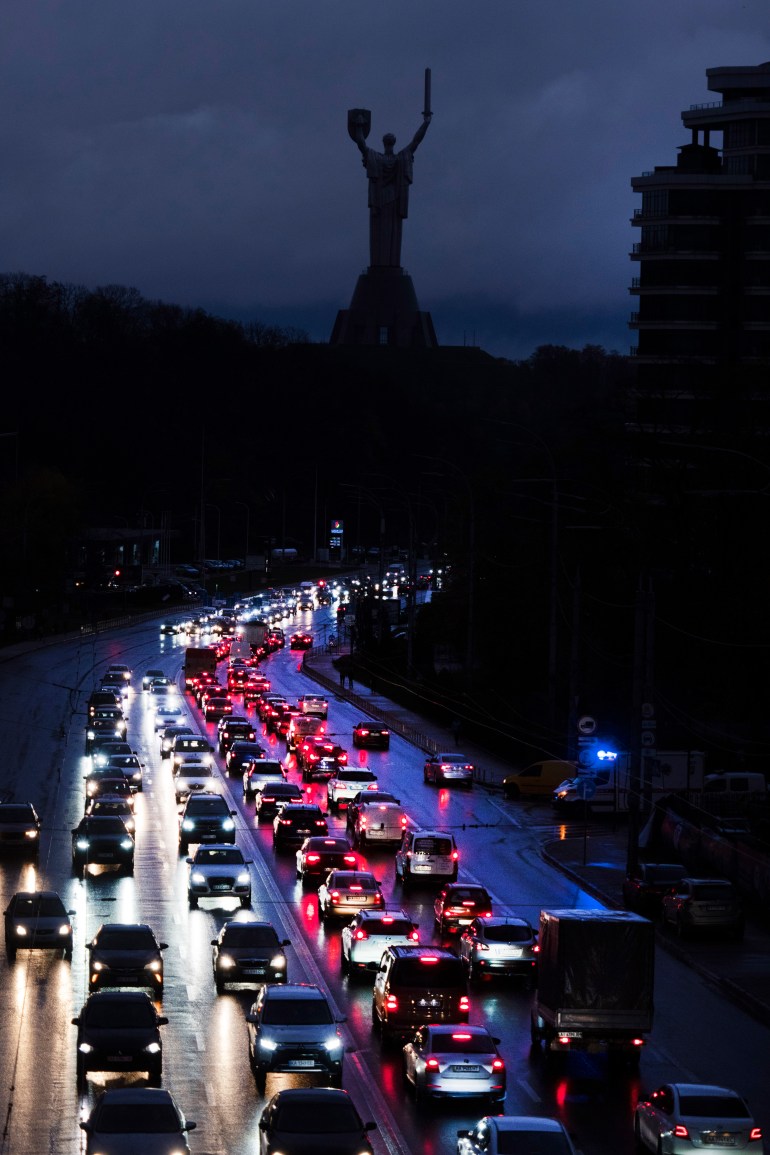Russia signals possible Kherson retreat, but Ukraine wary
Battle for Kherson grinds on as 4.5 million Ukrainians left without power amid Russian attacks on energy infrastructure.

A Moscow-installed official in the Kherson region has indicated Russian troops might pull back from the west bank of the Dnieper river, but as the United States sounded an optimistic note on Ukraine’s ability to retake the strategically-important southern city of Kherson, Kyiv was more wary.
“Most likely our units, our soldiers, will leave for the left (eastern) bank,” Kirill Stremousov, the Russian-installed deputy civilian administrator of the Kherson region, said in an interview on Thursday with Solovyov Live, a pro-Kremlin online media outlet.
Keep reading
list of 4 itemsUN inspectors find no sign of ‘dirty bomb’ in Ukraine
Ukraine says nuclear plant off-grid after Russian strikes
Russia sparks global food crisis fears, again, as war grinds on
The area includes Kherson city, the capital of the region of the same name, and the only major Ukrainian city captured intact since Russia invaded the country eight months ago. It also includes one side of a dam across the Dnieper, which controls the water supply to irrigate Crimea, the Ukrainian peninsula Russia seized and later annexed in 2014.
Previously, Russia had denied its forces were planning to withdraw from the area, with any retreat representing a significant defeat for its forces.
There was no word on Thursday from senior officials in the Kremlin, as photos circulated on social media of key buildings no longer flying Russian flags.

Natalia Humeniuk, a spokesperson for Ukraine’s southern military command, said talk of a retreat could be a Russian trap and the photos – shared on pro-Kremlin Telegram accounts – misinformation.
“This could be a manifestation of a particular provocation in order to create the impression that the settlements are abandoned, that it is safe to enter them, while they are preparing for street battles,” she said in televised comments.
‘Clear as mud’
Russia has been fighting for months to hang on to the pocket of land it holds on the west bank at the mouth of the Dnieper River that bisects Ukraine.
Ukraine has been advancing since the start of October, attacking the main bridges across the river and making it difficult for Russia to keep supplying its troops on the west bank.
US Defence Secretary Lloyd Austin, speaking at the Pentagon on Thursday, did not answer a question about whether Russian forces were preparing to leave, but expressed confidence in Ukraine’s ability to beat back them back.
“On the issue of whether the Ukrainians can take the remaining territory on the west side of the Dnipro [Dnieper] river and in Kherson, I certainly believe that they have the capability to do that,” Austin said.
“Most importantly, the Ukrainians believe they have the capability to do that. We have seen them engage in a very methodical but effective effort to take back their sovereign territory.”

A Western official, speaking to the Reuters news agency on condition of anonymity, assessed Russia was planning to retreat to the east of the river so it could better defend its forces.
“We think that that planning is almost certainly well advanced,” the official said, adding that some Russian commanders had rebased already.
“We would assess that in Kherson, it’s likely that most echelons of command have withdrawn now across the river to the east, leaving pretty demoralised and often in some cases leaderless troops to face off Ukrainians on the other side,” the Western official said.
Ukrainian troops on the front line are more cautious, however, telling Reuters’s reporters who visited last week they had seen no evidence Russian forces were withdrawing and believed they were, in fact, strengthening their positions.
Writing on Twitter, Michael Kofman, director of Russia Studies at the Center for Naval Analyses in Washington, DC, who has recently returned from areas near the Kherson front, said Moscow’s intentions were unclear and fighting in Kherson was “difficult”.
He doubted Russia would abandon the west bank of the river “without being forcibly pressed out”, but he also “could be wrong about this”.
“The situation in Kherson is clear as mud,” Kofman wrote.
‘Energy terrorism’
With the war increasingly focused on Kherson, Kyiv condemned what it said was the “mass forced relocation” of its citizens living in regions occupied by Russia.
“The Russian occupation administration began mass forced relocation of residents of the left-bank of the Kherson region… to the temporarily occupied Crimea or to Russia,” the Ukrainian foreign ministry said in a statement on Thursday.
“Similar deportations are also being carried out by Russia in the Zaporizhia, Luhansk and Donetsk regions, as well as in Crimea.”
Moscow-installed Kherson governor Vladimir Saldo said he was moving people further into the region or to Russia because of the risks of a “massive missile attack”. The Moscow-installed authorities there said last week that 70,000 civilians had left their homes on the right bank of the Dnieper.
Ukraine has accused Russian forces of war crimes during the eight-month-long war, charges Moscow rejects. Russia denies deliberately targeting civilians, though the conflict has killed thousands, displaced millions and destroyed cities and towns.
The flag’s removal is the first indication that the Russian military may be preparing to abandon the city of Kherson, the only regional capital that Moscow has captured in its eight-month invasion. https://t.co/rStKjiOVLC
— The Moscow Times (@MoscowTimes) November 3, 2022
Recent attacks on Ukrainian energy and water supplies have hit civilians hard as winter approaches, a time when temperatures can fall well below zero degrees Celsius.
Some 4.5 million Ukrainians in the capital Kyiv and 10 other regions were left without power in the latest blackouts caused by Russian attacks, President Volodymyr Zelenskyy said in his nightly video address.
The Zaporizhzhia Nuclear Power Plant (ZNPP) in southern Ukraine, Europe’s largest, was also disconnected from the power grid after shelling damaged the remaining high-voltage lines, leaving the facility to run only on diesel generators.
“The very fact that Russia is resorting to energy terrorism shows the weakness of our enemy. They cannot beat Ukraine on the battlefield, so they try to break our people this way,” Zelenskyy said.
Russian strikes over the past month have destroyed about a third of Ukraine’s power stations and the government has urged Ukrainians to conserve electricity as much as possible.